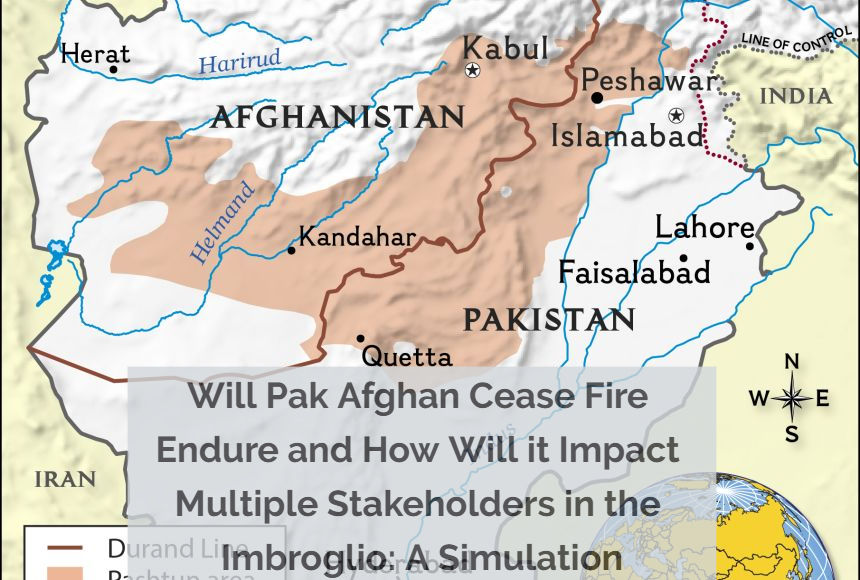Afghanistan Forecast November 2025: Taliban Asserts Autonomy
- Security Risks Research
- Nov 18, 2025
- 4 min read

Demonstrating the irony of Pakistan’s belief of establishing a regime in Kabul that could be controlled from Islamabad, Taliban asserted autonomy highlighting territorial sovereignty which shocked the Establishment of the Eastern Neighbour which is now searching for answers from a two front dilemma – India and Afghanistan.
Here is a detailed forecast for November and beyond-
International Relations. Europe’s attention is expected on refugees with deportations seen as an attempt to return deviants to the home country. Yet given the unfavourable conditions in Afghanistan, human rights groups will continue to pressure government to delay return. Despite the deportations, Europe is seen as a destination of choice by Afghans facing multiple hazards in traveling through Iran and Turkey. Trade with Europe is also likely to be increased given establishment of export chain despite the disruptions through Pakistan.
Despite a drop in aid allocation, United Nations humanitarian support will remain on stream and will be welcomed by the Taliban while rejecting injunctions on human rights and domestic political developments including inclusiveness. Internationally inclusiveness will remain a core demand along with adoption of universal human rights which will continue to be resisted by the Taliban. Expansion of economic and trade relations with Russia can be anticipated. Pakistan’s deportations of Afghan refugees who worked with U.S. forces or awaited resettlement, sending them back to Taliban-controlled Afghanistan will remain contested as in the larger perspective this undermines credibility of western alliances to muster support in extra territorial operations. President Trump’s intention to resolve the Afghan-Pakistan clashes is unlikely to lead to the success at least temporarily in managing the Israel Gaza clashes as he lacks the requisite leverages.
Regional Relations. The Cease fire agreement in Istanbul may prevail in reducing the clashes as Taliban and Pakistan representatives failed to agree on the fundamental issues in two rounds of talks first in Doha and the second in Istanbul. Durand Line will remain a touch point for Afghanistan while Tehreek Taliban Pakistan for Pakistan as an interim point of dispute but the larger claims of unfair division of the Pashtun ethnic group, undermining tribal unity and Afghan sovereignty implies that there is unlikely to be any long-term rapprochement between the two sides. Expansion of engagement between Kabul and New Delhi is a contrarian response to the deterioration of that between Islamabad and Kabul and thus this zero sum game is expected to be another factor in the regional rivalry of the principal stakeholders unlikely to benefit any of the parties and in fact only adding to the enmity. So prolonged tensions in relations between the three rivals in South Asia can be anticipated which in turn could contribute to regional instability mainly impact engagement with Central Asia as well. Expansion of trade with Iran and Central Asia until and after restoration of the access to Pakistan can be anticipated as the objective of gaining alternate routes for trading with Pakistan will remain a major concern.
Political Developments. There was unity in the Taliban leadership as well as former Republic leaders in condemning Pakistan air strikes and cross border strikes which will continue despite the presence of pro Islamabad elements in the leaders in Kabul The Taliban’s blending of modern and Islamic education may reshape Afghan culture by reinforcing religious identity while limiting pluralism, especially for women and minorities. Its societal benefit depends on inclusivity and implementation. Growing differences in the North and South, ethnic challenges and related issues are likely to remain concerns ahead. Meanwhile no concession on the rights front is anticipated despite international pressure. Concerns over lack of commitment of the Taliban to Universal Human Rights given normalizing of relations by multiple countries and groupings need to be underlined.
Internal Security. There is growing unease over presence of foreign terrorist groups in Afghanistan despite Taliban denial and ongoing talks with Pakistan. CSTO countries are also likely to raise the issue and are expected to intensify border security jointly in Tajikistan.
Defence. After experience of the cross-border attacks from Pakistan, Taliban is expected to enhance security on the Durand Line, not recognized by it as the border. Cross Durand Line forays and clashes with Pakistan army can be anticipated. Support to TTP is also likely to continue though in a deniable form. Improvement of defence potential in the form of upgrading of tanks, mechanized vehicles and weapon systems is likely. Acquisition of drones and air defence capabilities is also likely.
Economy. Taliban will continue to expand trade with other neighours Iran, India and Central Asia to offset losses due to blockade by Pakistan. Attempts to expand the economy through infrastructure developments and contracts with multiple foreign investors are expected to gather pace. However, the expected uptick in economic growth will be belied given increase in the level of humanitarian challenges arising from refugee inflow, natural disasters and a decline in aid and assistance from abroad. . Persistent structural challenges and a 10% decline in international assistance constrained growth in FY2025 as assessed by multiple agencies. Thus, overall economic outlook remains highly problematic, with low growth likely over the medium term. The FY2026 growth forecast is revised down in light of reduced international humanitarian aid, the forced return of Afghan refugees, little support for basic needs, and a fragile private sector.




Comments